Tengzhong has a bumpy road ahead

For many it's appropriate that Hummer means a horse that cannot be tamed in Chinese because they believe the bulky, gas-guzzling utility vehicle would not co-exist happily with Tengzhong's stable of other products.
Although the first, tentative hurdles with bankrupt General Motors have been cleared, a long and tricky field lies ahead before the Sichuan-based heavy industrial machinery company can gallop past the finishing post to claim its prize.
Some punters believe it's a race that cannot be won; others claim it's a race not worth winning.
"Purchasing a horse is easier than taming one," cautioned many analysts who have been observing developments closely and who identified two particular obstacles.
"Firstly, the Ministry of Commerce has not expressed its attitude toward the acquisition. Secondly, Tengzhong has no auto-related operational experience," said Jia Xinguang, chief analyst with the Chinese National Automotive Industry Consulting and Development Corp.
Hummer's CEO, James Taylor, said he was very confident of getting the nod from Chinese regulators despite many expressions of doubt coming from China, according to the Xinhua news agency.
"To get regulatory approval, Tengzhong has to convince relevant departments that the lineup it acquired will be energy-efficient and in accordance with the environment protection strategy," said John Zeng, senior market analyst with Global Insight Inc.
Tengzhong would obtain ownership of the Hummer brand, its trademark and trade names, as well as use of patents needed for the manufacture of the vehicles, according to the as yet unratified agreement.
It remains unclear what stage negotiations have reached between the relevant parties or what the details are. All sides are keeping mum for the time being. And during this period of Purdah, many are wondering what Tengzhong hopes to achieve. Some have even, strictly off the record, dubbed it a publicity stunt, bringing international recognition to an otherwise little-known company.
"The key point is how Hummer's next generation - H3 - would be developed. The future star model, which is said to be more energy-efficient, will replace the fallen H2 model," said Zeng.
Some observers doubt the company's green strategy would derail Hummer's original purpose as a special use and all-terrain military truck. They question the purpose in buying a brand that is effectively no longer appropriate for the current age.
"If you need a green vehicle, why choose Hummer and spend hefty amounts of money to redesign it?" asked Zeng.
The analyst said it was also questionable whether GM would allow Tengzhong to produce the H3 and use H3 patents outside the US.
Tengzhong will definitely put more focus on the Chinese market, Zeng said, echoing the company CEO Yang Yi's statement that it would devote more effort in emerging markets. However, he added that China was still a relatively small market for sports utility vehicles (SUVs).
According to the deal, Hummer's production would remain in the US and GM would provide key components, vehicle manufacturing and assembly as well as other business services over the transitional period. The existing senior management and operational team would also be retained.
Yang said Tengzhong had not ruled out the possibility of setting up a production base in China - something analysts doubt would happen in the short term.
"How to run and manage an international brand such as Hummer is a challenge for the manufacturer. Tengzhong has to make itself aware of international operating principles as well as the overseas legal environment," Jia Xinguang said.
With so many questions unanswered, and the terrain so uncertain, it's no wonder the betting man is at a loss where to put his money.
 0
0 






